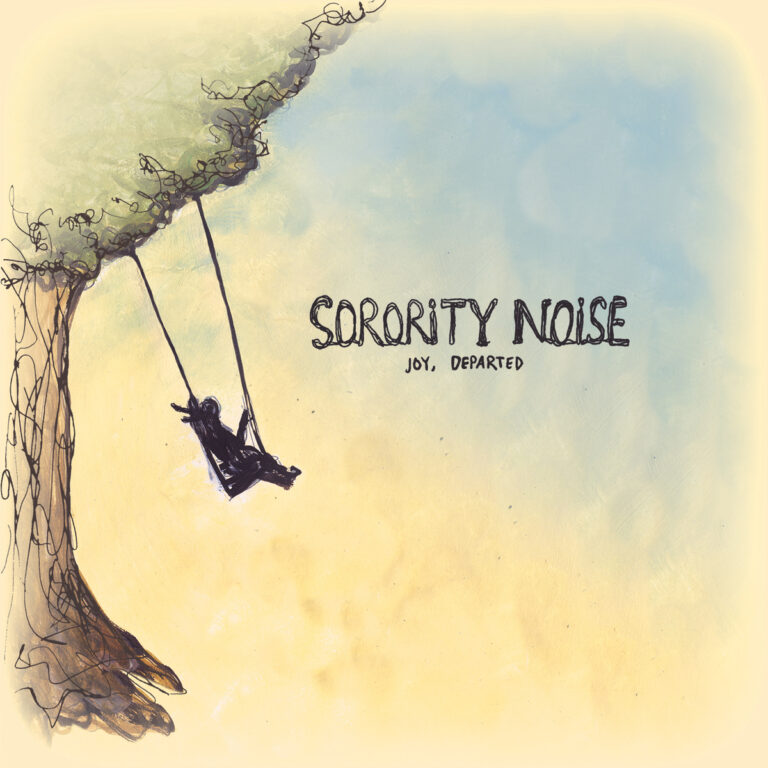Sorority Noise are an emo band from Hartford, Connecticut, led by frontman Cameron Boucher. Their second full-length, Joy, Departed, came out last month, and I’m not even going to apologise for being late anymore.
On first inspection, you might think Sorority Noise are pushing the same things as the majority of other emo bands. That is, isolation and loneliness in the aftermath of a doomed relationship, pulling no punches in bringing forth every worry and aching pain to present to the listener. You know the deal, heartbroken, hard-done-by Hero sings/shouts/screams about the injustice of his life after Pretty Love takes up with Slimy Evil Guy. This type of teenage, I’m-so-misunderstood melancholy is doubly effective, providing a sense of connection to anyone unlucky enough to find themselves in the throes of an adolescent heartbreak, while proving immensely gratifying to everyone else in the way that manufactured grief is always gratifying – a distracting and digestible simulacrum of suffering, a romantic and wistful removed-from-Real-Life pain, like watching an episode of The OC with your name in the main credits.
But the thing is, anyone listening closely will soon discover that Sorority Noise are different. What sounds on the surface like the age-old angst record is in fact far deeper, the band managing to subvert the genre tropes to make something far more interesting and nuanced. And what’s even more interesting is how Boucher & co. manage to do this. The answer to rising above self-absorbed, why-have-you-forsaken-me pity turns out to be an increased focus on the self. Increasing the duration and intensity of this self examination actually eradicates, perhaps paradoxically, any sense of self-indulgence. However, as much as it makes for more rewarding art, eschewing Hollywood melancholy in favour of exploring Real Life comes at a cost. The pain here is far from superficial, the stories not tied into neat bows of happy endings, the anxiety and depression not some shallow puddle but a floorless ocean full of dark shapes.
The narrator’s pain manifests as addiction, a theme made clear on opener ‘Blissth’ (“Let me be the drug that you use to fall in love/The heroin that keeps you warm enough”) which persists across the album. ‘Corrigan’, with verses almost akin to Spook Houses, details the defeated-but-still-in-love vibe of traditional emo, and ‘Nolsey’ follows a similar vein (“I know you’ll never love me/I’ll pretend that you love me/You’ll always be the reason I stay clean). It is over these next few tracks that you feel Boucher comes to a gradual epiphany, where the focus shifts onto himself and it becomes apparent that failed relationships and addiction are effect rather than cause, symptoms of something deeper and more personal. ‘Art School Wannabee’ sees this idea reached:
“Maybe I’m my own greatest fear,
maybe I’m just scared to admit that
I might not be as dark as I think
Maybe I’m not the person that I never wanted to be”
[bandcamp width=100% height=120 album=3982547517 size=large bgcol=ffffff linkcol=0687f5 tracklist=false artwork=small track=502597836]
By ‘Using’, which sees a relapse into guilt and vicodin, the message of the record becomes clear. The positivity here is not based on circumstance but instead in the will of the narrator, understanding that depression is not a binary healthy/sick (functional/broken) deal and emotional wellbeing can be pursued even from what might feel like rock bottom. The album is about learning to accept bad things without ever surrendering to them:
“I’ve started loving again
I’ve stopped wishing I was dead
learned to love myself before anyone else
become more than just a burden
I know I’m more than worthy of your time”
“I’ve gotten better, at getting better.
I’ve gotten better, at being me.”
[bandcamp width=100% height=120 album=3982547517 size=large bgcol=ffffff linkcol=0687f5 tracklist=false artwork=small track=2706192710]
Flipping the focus from the outward, uncontrollable suffering of circumstance to the inward, controllable and conquerable suffering of your own feelings and behaviour, Sorority Noise aim higher than your average emo band. They, along with bands like The Hotelier (whose album we never managed to cover but recommend highly) are making music instilled with a higher sense of purpose and value, the kind all artists should aim for. Why settle for comfortable suffering when there is a chance of painful healing?
Joy, Departed is out now on Topshelf Records and you can grab it via the Sorority Noise Bandcamp page (including some nice vinyl).

